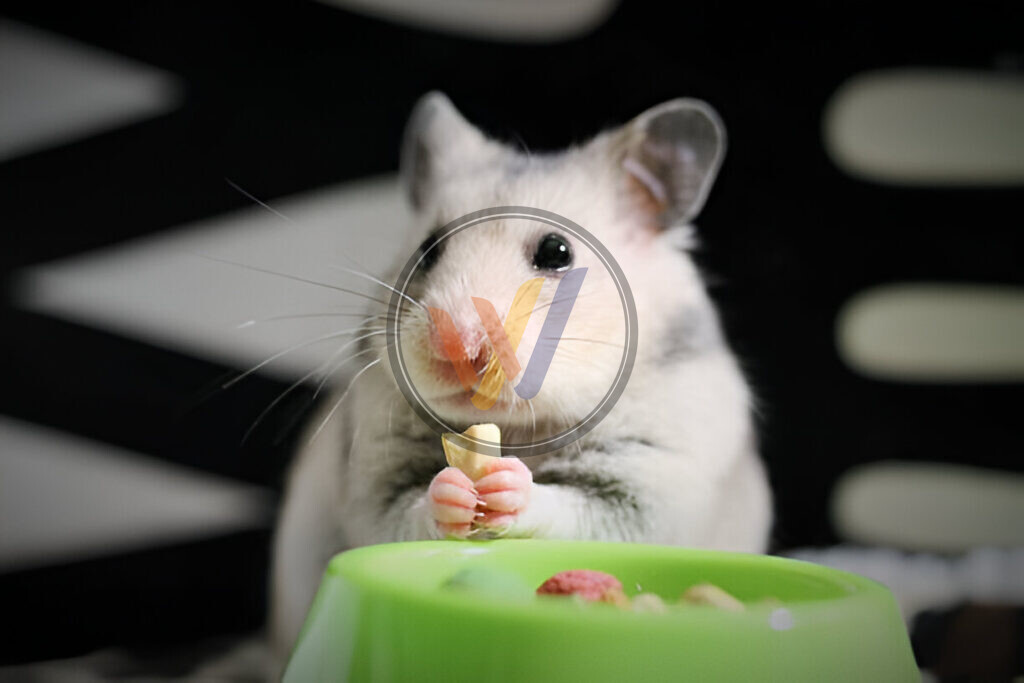BLOG
Hamster Nutrition: Essential Foods and Ideal Portions
Hamster Nutrition: Essential Foods, Foods to Avoid, and Ideal Diet Portions
Hamster nutrition is crucial for ensuring these small pets thrive and remain energetic. A well-balanced diet not only helps prevent health issues but also enhances their lifespan. Below is a detailed guide on hamster nutrition, including essential foods, foods to avoid, and how to portion their meals appropriately.
1. Essential Foods for Optimal Hamster Nutrition and Well-being
To support your hamster’s health, it’s essential to provide a variety of food types. Hamsters are omnivores, and their diet should include grains, fresh fruits, vegetables, and some sources of animal protein. Here are the types of food that should be included in their daily diet for optimal hamster nutrition:
- Commercial Hamster Food Mix for Balanced Nutrition
This is the best option for hamster nutrition since it is formulated to meet all the necessary nutrients. A good hamster food mix typically contains grains, seeds, and some protein and fiber-rich foods. Choose a reputable brand that does not contain preservatives or harmful additives. - Grains and Seeds as Key Components of Hamster Nutrition
Grains like oats, millet, and flaxseeds provide essential fiber and carbohydrates to keep hamsters active. However, ensure that the seeds are not moldy, as this can harm their digestive system, negatively affecting their overall hamster nutrition. - Fresh Fruits and Vegetables to Enhance Hamster Nutrition
Vegetables like carrots, broccoli, and cucumbers are excellent sources of vitamins and minerals for hamster nutrition. You can also give them small amounts of fruits like apples (remove the seeds), pears, and bananas. However, these should only be given in moderation to prevent digestive issues. - Animal Protein Sources to Support Hamster Nutrition
To supplement hamsters nutrition, you can offer a small amount of boiled (cooled) eggs or a bit of boiled chicken (without seasoning). Some hamsters also enjoy mealworms, which are a good source of protein and fat. - Hay and Dry Grass for Fiber in Hamster Nutrition
Hay and dry grass provide important fiber to improve digestion and help keep their teeth healthy since hamster teeth grow continuously. Make sure the hay is free of preservatives and cleaned before feeding, as part of a balanced hamster nutrition plan.
2. Foods to Avoid for Hamsters
Certain foods can be harmful to hamsters and should be completely avoided:
- Fruits with Seeds
Fruits like apples, cherries, or plums contain cyanide in their seeds, which is toxic to hamsters. - Salty or Sugary Foods
Foods high in sugar, such as candy, cakes, or those with high salt content can lead to kidney problems and increase the risk of diabetes in hamsters. - Spicy Foods Like Onion and Garlic
Onions and garlic contain compounds that are unsafe for hamsters and can lead to toxicity. - Chocolate, Coffee, and Caffeinated Beverages
Products containing caffeine, such as chocolate and coffee, are toxic to hamsters and can cause serious issues with their nervous system. - Dairy Products
Hamsters cannot properly digest lactose, so avoid dairy products like yogurt and cheese to prevent digestive problems.
3. Ideal Portions for Effective Hamster Nutrition
Hamsters nutrition involves providing appropriate portions since hamsters have small stomachs and do not need large meals at once. Instead, their food should be divided into smaller portions throughout the day. Here’s a standard feeding guideline for adult hamsters regarding their nutrition:
- Hamster Food Mix for Daily Nutrition: 1-2 teaspoons daily.
- Fresh Fruits and Vegetables for Supplementing Hamsters Nutrition: Add a small piece (about 1-2 grams) of veggies or fruit each day for vitamin supplementation.
- Animal Protein for Enhanced Hamsters Nutrition: Once or twice a week, include a small amount of animal protein like a small piece of boiled egg or mealworms.
- Water as an Essential Component of Hamsters Nutrition: Ensure hamsters always have access to clean water, changing it daily as part of good hamsters nutrition.
Tips for Feeding Hamsters
- Remove Uneaten Food Promptly: If fresh food is not consumed within a few hours, take it out to prevent spoilage and potential poisoning.
- Monitor and Adjust: Keep an eye on your hamster’s weight and activity levels. If they show signs of weight gain or obesity, reduce sugary and fatty foods in their diet.
- Vary the Diet: Hamsters enjoy trying new foods, and changing things up a bit each week can help keep their meals interesting.
Conclusion
Caring for a hamster’s diet isn’t overly complicated but requires understanding and attention to detail. By choosing appropriate foods, avoiding harmful items, and maintaining proper portion sizes, you can help ensure your hamster lives a happy and healthy life. Always observe their health and behavior to adjust their nutritional regimen accordingly!
WINVN INT CO., LTD
Natural joy made in Vietnam
☎️ +84 932 118 447
📧 info@winvnint.com
🌐 winvnint.com
🌐 https://winvnint.trustpass.alibaba.com/
📌 29, 29 Street, Van Phuc Residence, Thu Duc City, Ho Chi Minh City, Vietnam
 Tel: (+84) 932 118 447
Tel: (+84) 932 118 447  Email: info@winvnint.com
Email: info@winvnint.com 










